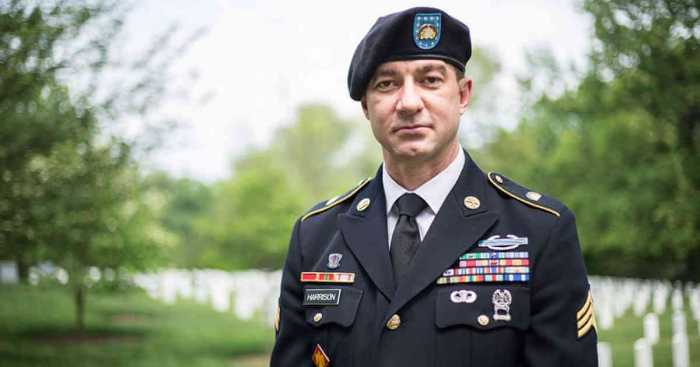The widow of US Army Chief Warrant Officer Charlie Morgan (pictured), who died on February 10, is not eligible for military or Social Security death benefits. | OUTSERVE-SLDN
In response to growing demands from advocates for gay and lesbian military service members, the Defense Department on February 11 announced a new list of benefits that will be made available to their same-sex domestic partners and spouses.
The list is comprised of more than 20 benefits, including the Dependent ID cards that allow access to military bases, commissary and exchange privileges, the availability of family support services, and joint duty assignment opportunities. The benefits, announced by Defense Secretary Leon Panetta, who is departing the administration, builds on a more modest group made available in the 17 months since the Don’t Ask, Don’t Tell policy came to an end.
“Taking care of our service members and honoring the sacrifices of all military families are two core values of this nation,” Panetta said. “Extending these benefits is an appropriate next step under current law to ensure that all service members receive equal support for what they do to protect this nation.”
Same-sex spouses, partners of service members gain some, not all rights legally possible
At the same time, the Pentagon chief said that “legal limitations” imposed by the 1996 Defense of Marriage Act (DOMA) barred the provision of benefits directly tied in law to spousal status.
Allyson Robinson, the executive director of OutServe-SLDN, the leading advocacy group for lesbian and gay soldiers, praised Panetta for extending “nearly the full extent [of benefits”] permitted under current law, but noted that certain rights — including burial rights at national cemeteries and some overseas travel for spouses — that could be made available while DOMA is still in place were not.
Still, Robinson concluded that Panetta’s action was “substantive.” As former Nebraska Senator Chuck Hagel has moved through the confirmation process to replace Panetta, he has been pressed to agree to moving on partners’ rights and benefits, which he committed to do despite a record in Congress of voting against the LGBT community’s interests.
In explaining the Pentagon’s failure to move on those questions — including, as well, on-base housing — the memorandum announcing the new benefits referred to “complex legal and policy challenges” and also “scarce resources.” The military is presumably concerned about the cost of providing new housing units and other benefits that require additional expenditures.
Because of DOMA, the issue of partner benefits has been a continuing saga, with some of the most important and valuable benefits authorized by statutes that define eligibility in terms of spouses. For benefits not explicitly defined in that way, the Defense Department was able to work around existing limitations by establishing a new status of registered domestic partnership for same-sex couples, with no reference made to whether or not they are legally married. Unlike married heterosexual members of the military, a soldier in such a partnership must affirm that they live with their partner or would do so “but for the requirements of military service.”
In tacit acknowledgement of the fact that DOMA is currently before the Supreme Court — several of the cases challenging its constitutionality have been filed against the Pentagon — the Defense memorandum states that should the 1996 law no longer apply to the military, same-sex couples married under state law would immediately be recognized and treated equally with different-sex married couples.
The memorandum’s introduction states, “Discrimination based on sexual orientation no longer has a place in the military” and that “equal dignity and respect” should be extended to all service members. Panetta’s announcement gets closer to that, but not all the way. One unanswered question is why the military has not adopted a formal policy banning sexual orientation discrimination, similar to the policy adopted during the Clinton administration governing civilian employment at the Defense Department. If such discrimination has no place, why not outlaw it? One possibility is that it would put the Pentagon in an awkward position when continuing to deny on-base housing for same-sex couples.
The OutServe-SLDN press release noted that even with this “encouraging… step,” the family of US Army Chief Warrant Officer Charlie Morgan, who died February 10 after a two-year battle with breast cancer, has “needs in danger of going largely unmet because of” DOMA.
Morgan’s surviving spouse, Karen, is barred from receiving military, Social Security, and other benefits to help her care for their five-year-old daughter Casey Elena. The Morgans joined the 2011 lawsuit filed by SLDN against DOMA.
“I hope our Supreme Court justices are watching as these events unfold, and that they see that striking down DOMA is the only way this unjust and untenable situation can be rectified,” Robinson said. — Additional reporting by Paul Schindler
































